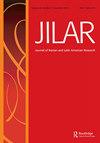电影镜头下的机械主义:居住在悉尼的墨西哥移民对性别和性观念的变化
IF 0.3
0 HUMANITIES, MULTIDISCIPLINARY
Journal of Iberian and Latin American Research
Pub Date : 2022-05-04
DOI:10.1080/13260219.2022.2132270
引用次数: 1
摘要
摘要在拉丁美洲,机械主义是一个经常与制度和社会父权制联系在一起的概念;尽管如此,它比这更普遍。从广义上讲,它意味着男性对他人,即女性和其他男性的支配地位的发挥,这种支配地位是基于男性或多或少具有男子气概/“男子汉气概”的超男性化和异质性结构,而女性则是“贞洁保守”或“妓女”。这些二元结构往往阻碍复杂性浮出水面,因此,需要在墨西哥移民经历的背景下考虑用于将拉丁美洲描述为machista和将澳大利亚描述为“进步”的话语。通过使用电影刺激和基于话语的身份认同方法,居住在悉尼的五名墨西哥移民分享的叙事阐明了一个社会环境比另一个更自由的断言,以及这些与男性主义的看法之间的关系。本文章由计算机程序翻译,如有差异,请以英文原文为准。
Machismo through the Lens of Film: Changing Perceptions on Gender and Sexuality among Mexican Migrants Living in Sydney
ABSTRACT Machismo is a concept often associated with systemic and social patriarchy in Latin America; nonetheless, it is more pervasive than that. In a broad sense, it entails the exertion of male dominance over others, namely women and other men based on a hypermasculine and heteronormative construction of men as more or less macho/“manly,” and women as either la virgen (virtuous and conservative) or la puta (whore). These binary constructs often impede complexities to surface and thus, discourses used to describe Latin America as machista and Australia as “progressive” need to be considered in the context of the Mexican migratory experience. Through the use of filmic stimuli and a discourse-based approach to identity, the narratives shared by five Mexican migrants living in Sydney elucidate assertions of one social milieu being more liberal than the other and how these are related to perceptions on machismo.
求助全文
通过发布文献求助,成功后即可免费获取论文全文。
去求助
来源期刊

Journal of Iberian and Latin American Research
HUMANITIES, MULTIDISCIPLINARY-
CiteScore
0.60
自引率
0.00%
发文量
22
 求助内容:
求助内容: 应助结果提醒方式:
应助结果提醒方式:


